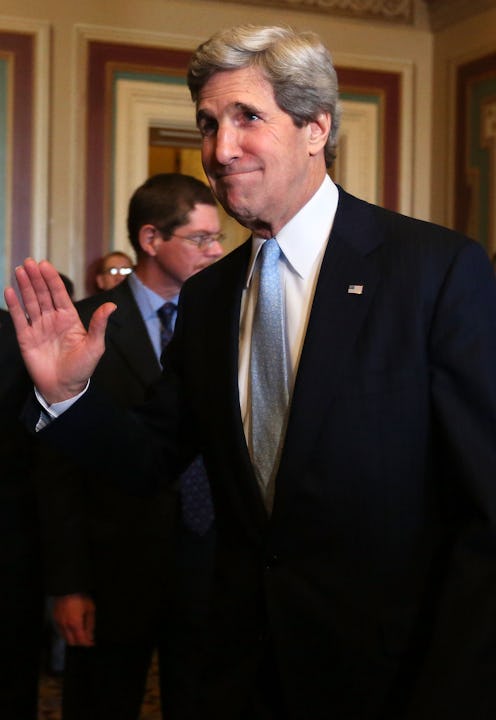News
Kerry's Last-Minute Detour Is A Big Deal
Don’t hold your breath just yet, but nuclear talks between Iran and the West may be within striking distance of actually accomplishing something, a result that’s eluded both sides for over three decades. NBC just reported that U.S. Secretary of State John Kerry will be making an unplanned stop in Geneva tomorrow, where Iran and six other countries are currently meeting to try and hammer out an agreement. While this itself doesn’t directly mean anything, the fact that Kerry is taking time out of his schedule to make a last-minute appearance at the final day of negotiations — which have already reportedly been going well — strongly suggests that a deal may be near.
Iran, Germany, Britain, France, the U.S., Russia and China — the P5+1, as the group is called — started negotiating today in Geneva earlier today. Western countries want to slow Iran’s uranium enrichment and obtain some sort of assurance that the country isn’t trying to construct a nuclear weapon; Iran, in turn, wants relief from the crippling sanctions the West put in place last year, which have been seriously damaging to the country’s economy.
While the U.S. and Iran have basically been on bad terms since modern Iran came into existence in 1979, the conciliatory tone taken by the country’s new president, Hassan Rouhani, has convinced some in the West that a thawing of the two countries’ relations may be possible. Rouhani and U.S. President Barack Obama spoke on the phone in late September, which was the first time a U.S. and Iranian head of state had talked directly since Jimmy Carter was in the White House, and Rouhani has been consistently optimistic on the possibility of an agreement with the West (This in contrast to his predecessor, who regularly referred to the U.S. as “Satanic” and called for America's annihilation).
As Bustle reported earlier, recent discussions between Iran, its allies and the West have been going well:
Although details of the conference are confidential, Iran’s hour-long PowerPoint, titled ’Closing an unnecessary crisis, opening new horizons,’ reportedly included several proposals about their nuclear program, which they maintain is peaceful. Michael Mann, the spokesman for EU Foreign Policy Chief Catherine Ashton who’s leading the P5+1 talks, even went so far as to call the presentation “very useful.” Other members of the world power P5+1 group (which includes representatives from the United States, Russia, China, France and Britain, plus Germany) said they were also impressed with the presentation and pleased with Iran’s cooperation.
“For the first time, we had very detailed technical discussions,” a senior U.S. State Department official said.
That was in reference to talks that took place three weeks ago. According to Mohammed Javad Zarif, the moderate diplomat Rouhani appointed to head the country’s Foreign Ministry, the latest round of talks is also showing promise.
"The talks went well," Zarif told Reuters after Thursday’s morning session. "I'm hopeful that we can move forward. We are making progress, but it's tough.”
The countries maintain that the Geneva talks are modestly aimed at reaching a “first step” in understanding between the two countries. One deal being floated would involve the West partially easing its sanctions in exchange for Iran partially scaling back its nuclear program:
A senior aide to a U.S. senator briefed by the White House and State Department said Washington would offer to work with Iran in a six-month confidence-building period. During that time, Washington would offer Tehran relaxed restrictions on Iran's funds held in overseas accounts. It could also ease sanctions on trade in gold and petrochemicals.
In exchange, Iran would stop enriching uranium to 20 percent and convert its existing stockpile of 20 percent uranium to an oxide form suitable for processing into reactor fuel and take other measures to slow the program.
Nevertheless, both sides are walking a thin line, as hawks in both Tehran and Washington are resistant to making any concessions whatsoever. Zarif ruled out the possibility of Iran fully suspending its enrichment program, a key demand of Isreal; the White House, meanwhile, is going out of its way to say that any easing of sanctions would be “limited, targeted, and reversible.”
Nevertheless, Kerry’s last-minute involvement in the negotiations is encouraging. At the very least, relations between the U.S. and Iran don’t seem to be deteriorating, which itself is something of an accomplishment.
